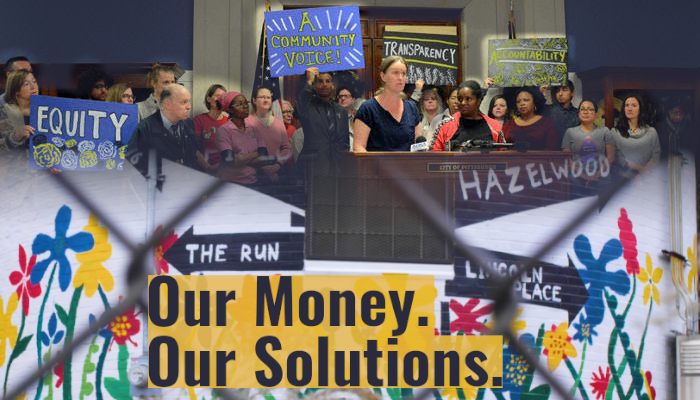
FOR IMMEDIATE RELEASE
April 10, 2020 // Pittsburgh, PA
Media Contact: Laura Chu Wiens, Executive Director of Pittsburghers for Public Transit: (703) 424-0854
New Report Shows Public Transit is More Effective than Mon-Oakland Shuttle Roadway
On Friday, April 10th, Pittsburghers for Public Transit (PPT) and data analysts at Tech4Society released a new report entitled The People’s Audit of the Mon-Oakland Connector, to evaluate the City’s proposed Mon-Oakland Connector shuttle roadway against resident proposals for expanded public transit services. The report demonstrates that minor Port Authority transit improvements would outperform even the best-case scenario for the Mon-Oakland shuttle roadway, and would better connect Institutions and residents within the corridor.
The crisis of COVID-19 has illustrated why it is that communities like Hazelwood need transportation access to food and hospitals. At a time of diminishing public resources, it has also become more apparent that the City needs to responsibly guide investment to effectively meet shared transportation needs.
Bonnie Fan, a researcher with Tech4Society, said, “We wanted to answer questions the public has raised regarding the cost to build and operate the project, ridership capacity and projected need, and anticipated travel time between key destinations like hospitals and the universities. In all categories, the Mon-Oakland Connector fails in comparison to public transit improvements.”
There is no question that better public transit is needed in this corridor to ensure the viability of communities and the residents that live within them. Hazelwood is a food desert, so residents must travel to other communities to buy groceries. Healthcare access is limited, as Hazelwood residents have no direct public transit routes to the hospitals in Oakland on the weekend. Finally, as Hazelwood Green builds out, there needs to be robust mass transit in place to prevent environmental degradation and the congestion of single-occupancy vehicle commuting. These are all important transportation needs that require a comprehensive solution.
The report shows that investment in the resident-generated transportation plan to add weekend service on the 93 bus and extend the 75 to Hazelwood would accomplish all of these goals. Moreover, building the 2nd Ave Bus Rapid Transit (BRT) corridor and consolidating the Oakland institutional shuttles would provide enormous benefits to the institutions and residents of the corridor.
Hazelwood resident and transit rider Deanna Turner says, “Even during this pandemic, I am still taking the bus everyday to work in Oakland, to buy groceries in Squirrel Hill or Homestead, and to get my son to doctor’s appointments at Children’s Hospital. Because we don’t have weekend service on the 93, I have to choose between arriving at work an hour early or late, and take 2 buses. Having the 75 to take us directly to Southside grocery stores and Oakland would be a huge benefit for me and my neighbors.”
PPT hopes that this report will encourage the City’s Department of Mobility and Infrastructure (DOMI) and stakeholder institutions to invest in long term, equitable public infrastructure and transit operating service rather than costly, short-term, and ineffectual solutions. The City’s anticipated $23 million capital dollars for the Mon-Oakland Connector could instead be an important down payment on the 2nd Ave rapid transit corridor, and address gaps in the neighborhoods’ bicycle and pedestrian networks. In addition, for a fraction of the anticipated $16 million 5-year operating expense, the foundations and institutional investors involved with Hazelwood Green could instead seed expanded Port Authority transit service.